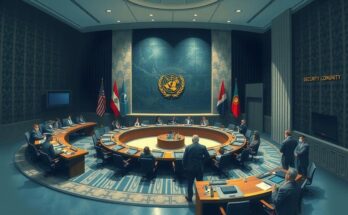Israel is escalating its military strategy on the Lebanese front amid ongoing tensions, establishing outposts and facing challenges with community buffer zones. Chief of Staff Eyal Zamir is directed to secure borders, and there are questions about Prime Minister Netanyahu’s potential diplomatic moves for conflict resolution.
Ongoing tensions along the Israel-Lebanon border, characterized by daily military actions including assassinations and bombings, have prompted Israel’s leadership to reassess security strategies in the region. The Israeli military now aims to establish numerous outposts along the border, extending to the northern limits, to create a formidable barrier protecting Israeli towns from southern Lebanon threats.
While constructing these military outposts is a tangible step forward, the challenge persists in persuading residents of northern Israel to engage in the establishment of buffer zones. In parallel, Israel’s military operations extend from neighboring areas to as far as Iran, accompanied by collaborative military exercises with the United States, designed to bolster military capabilities.
The newly appointed Chief of Staff, Eyal Zamir, has received directives emphasizing the necessity of securing Israel’s borders. There are rising questions regarding Zamir’s potential aggressive approach at the frontlines amid speculation whether Prime Minister Benjamin Netanyahu may pursue diplomatic efforts for progress aimed at concluding the conflict, aligning with the United States’ strategic vision.
In summary, Israel is intensifying its military strategy along the Lebanon border by establishing outposts and reevaluating security measures in response to ongoing tensions. While military exercises and collaborations are underway, the challenge remains in mobilizing community participation for buffer zone creation. With leadership transitions and potential shifts in diplomatic strategies, the future of Israeli-Lebanese relations continues to be in flux.
Original Source: www.lbcgroup.tv




